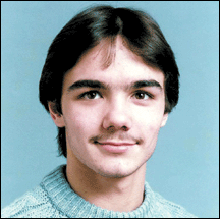
FROM THE DAY he was accused of sexually abusing children at the age of 19, Bernard Baran has insisted he is innocent. For that he has paid a high price in the prison system. |
This story originally appeared in the June 18, 2004 issue of the Boston Phoenix.
A note on this story
This is the first in a series of planned collaborations between the Boston Phoenix and the Boston University Investigative Journalism Project, a graduate seminar led by professors Dick Lehr and Mitchell Zuckoff. This story was written and reported by their students Dori Berman, Carrie Lock, Richard Rainey, and Lindsay Taub.The names of children and their relatives appearing in this article are pseudonyms.
IF HE HAD pled guilty to lesser charges, Bernard Baran would be a free man today.
But because he denied that he committed the multiple acts of child abuse of which he was accused, Baran couldn’t cut his losses. He felt he couldn’t plead guilty to something he didn’t do.
Today, almost 20 years later, Baran sits in Bridgewater State Prison, waiting for a new team of lawyers to reopen his case and establish that he was a man falsely accused. As awareness grows in Massachusetts and throughout the nation that the innocent are sometimes unjustly convicted, Baran hopes for another chance at justice.
Hope — and the courts — are all he has.
ON SATURDAY, October 7, 1984, Bernard Baran was at a friend’s house when the phone rang.
It was his friend’s sister, and she sounded anxious. She was worried about her daughter, Tina, who attended the Early Childhood Development Center, in Pittsfield, where Baran worked as a teacher’s aide.
"Bernie," she said, "I heard they’re investigating some monster at the day care for molesting kids. Can you keep an eye out for Tina?"
Baran agreed, and quickly got off the line. Tina’s mother saw him as a protector, but Baran knew that investigators thought otherwise. He hung up and turned to his friend.
"Will you tell her? I can’t do it," Baran recalls saying that day, 20 years ago. "This monster they’re talking about is me."
Over the next four months, Baran, at that time a slender, 19-year-old high-school dropout, looked on helplessly as his life was dissected, then destroyed. He was arrested, tried, and convicted of abhorrent crimes. A gentle soul who enjoyed taking care of children, Baran came to be seen as a predator who fondled and sodomized more than a dozen young boys and girls in the classrooms, bathrooms, and back-yard shed of the day-care center where he worked.
Baran’s conviction was the first in a wave of day-care-abuse cases that swept the country in the 1980s. In Manhattan Beach, California, several members of the McMartin family were tried for sexually abusing more than 40 children in satanic rituals. In Malden, the infamous Fells Acres day-care case saw Gerald "Tooky" Amirault convicted of similarly hideous crimes against children. While the scrutiny left all day-care workers susceptible to accusations, Baran was particularly vulnerable. He was gay.